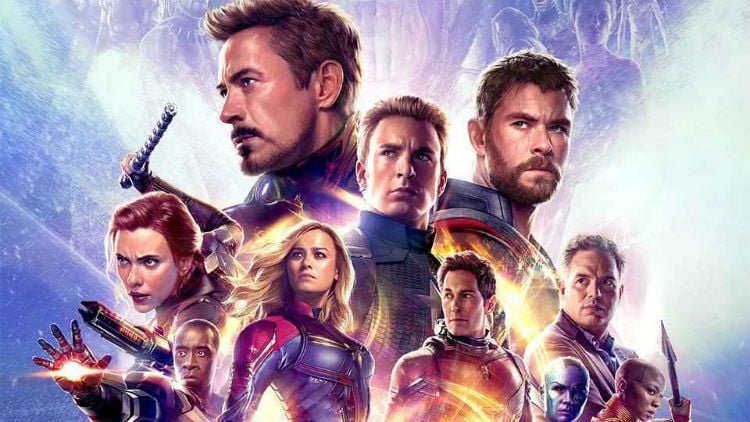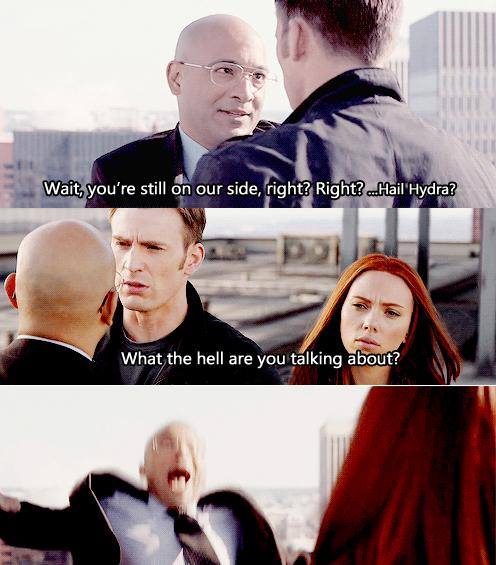
By now, you’ve likely seen ‘Avengers: Endgame,’ or you may be heading to the theaters this weekend to check it out (or check it out for the fourth or fifth time, which is cool too). The more you see and think about the film, the more questions arise – and with good reason. At just a shade over three hours, this is easily the lengthiest film in the Marvel Cinematic Universe, and there is a lot to unpack from scene to scene and from character to character.
Below, we’ve outlined 14 of the biggest questions we had after seeing ‘Endgame’ just a few times (okay, maybe a few more times than that). Each question will have a little bit of follow-up info to help get you thinking; this feature is not meant to be a deep dive into each question, but more of a guide to help get your gears turning a little bit. Enjoy!
How did Scott Lang really get out of the Quantum Realm?
Yes, it’s understood that the rat walked across the keypad, randomly starting up Scott’s re-emergence sequence. But are we to believe that he just floated in the Quantum space for five hours, twiddling his thumbs and doing nothing to try and help his situation? We’ve seen in both ‘Ant-Man’ and ‘Ant-Man and the Wasp’ that there is more to the Quantum Realm than meets the eye. Janet Van Dyne came back from the Realm with strange new powers, and visuals of the Realm have seemingly confirmed that there are both living creatures and settlements within – so what truly happened during Scott’s time there?
What are the ramifications of bringing back half the population five years later?
While audiences were thrilled that the half of the universe’s population that was “dusted” by Thanos was able to return to the land of the living, in their doing so five years after they left, several moral and ethical cans of worms were opened. Surely there are people that have “moved on” and started new lives after losing loved ones, so for the people who have now come back, through no fault of their own, they have put the original “survivors” in quite a quandary. In addition, it must be a strange thing, in general, to come back to a world five years later very – where do you “re-start?” If you had a house or apartment, it’s likely that someone else is living there now, or it’s fallen into serious disrepair. People who were in school – such as Peter Parker and Ned – will have to pick up where they left off, but clearly their “surviving” classmates have moved several years ahead – as have some of the subjects you’ve been studying in school, such as economics, technology, current events, etc. Quite a “laundry list” of issues to contend with.
Time Heist: How does Loki escaping with the Tesseract/Space Stone impact that reality?
With the God of Mischief pulling a dramatic if not convenient escape from his post-Battle of New York captivity, this particular timeline/reality appears to be pretty significantly changed. Now, Loki won’t be taken back to Asgard and imprisoned, so essentially the events as shown in ‘Thor: The Dark World’ and ‘Thor: Ragnarok’ will be significantly altered as well. Is there even a chance that Marvel can “resurrect” Loki in the “prime” timeline by having this version find his way over somehow? Or could this branched reality possibly be the subject of the forthcoming Disney+ series starring Tom Hiddleston?
Time Heist: How was the Morag reality affected by the Avengers’ actions?
This timeline/reality may be the one that saw the most change as a result of the Avengers’ actions. Thanos, Nebula, Gamora, Black Order, and Thanos’ minions have left this reality to be pulled into the “prime” timeline thanks to Past Nebula’s actions – this means that they are all now all completely gone from this alternate reality. How would the Guardians of the Galaxy’s lineup look? Would Star-Lord even form the Guardians, as he wakes up on Morag to find the Power Stone gone? Would Ronan, who would no longer be tracking the Power Stone there, still attack Xandar?
Time Heist: Does 2012 Post-Battle of New York S.H.I.E.L.D. think Captain America is a member of Hydra?
This may be one of my favorite questions to come from the film. As you likely recall, the “prime” Captain America was able to take the Scepter from the HYDRA agents (who were posing as S.H.I.E.L.D. at this juncture in their timeline) by indicating to them that he was with them, whispering “Hail Hydra” in a particularly juicy comic-book shout-out (more on this below). The Captain America that belongs to the timeline, however, doesn’t have this information – by HYDRA now thinks he does. This will surely make for an awkward experience next time these two factions cross paths!
Time Heist: How does Captain America’s returning of the Soul Stone go?
This could make for a bit of an awkward reunion. Captain America is tasked with returning the “borrowed” Infinity Stones to their original timelines. In returning the Soul Stone to Vormir, one has to assume that he’ll be giving it directly to the Keeper of the Stone, which is… Red Skull, his former nemesis from ‘Captain America: The First Avenger.’ Granted, the Red Skull we see on Vormir is quite a different person, internally, than he was in his Nazi days, but still… it’s gotta be an awkward encounter nonetheless. Do they fight? Do they reminisce about old times?
Time Heist: Captain America brings back the Mind Stone but didn’t appear to have the Scepter – how does that impact this reality?
This question is somewhat minimized by the fact that we’re talking about the same reality here that is already properly kerfuffled due to Loki getting his hands on the Tesseract, but it does bear noting that Scott Lang did take the entire Scepter back to the “prime” universe with him, and it appears that Captain America is only returning the Mind Stone in his reality-hopping mission. Let’s be real here: this reality is pretty much screwed. It would make for an excellent ‘What If?’ style story – another series that Disney+ will soon be bringing to life as well. Coincidence?
How “dangerous” is it for MCU characters to reference other movies that their actors have been in?
We’re getting a little “meta” here, but it bears noting that several times in the MCU now, popular films have been referenced that actually star actors who are doubling as characters in this “reality,” which one would assume would lead to some confusion there. Prime examples include ‘Star Wars’ and Samuel L. Jackson (Mace Windu there, Nick Fury here) … ‘The Big Lebowski’ and Jeff Bridges (Lebowski there, Obidiah Stane here) … and, remarkably, ‘Hot Tub Time Machine’ and Sebastian Stan (Blaine there, Bucky Barnes here).
What MCU characters were missing from the film… and why?
MCU head honcho Kevin Feige and others have noted in the past their clear preference to keep the TV side of the MCU largely separate from the film side of things, so this is likely why we haven’t seen the likes of Coulson & the Agents of S.H.I.E.L.D., Daredevil, Jessica Jones, Iron Fist, Luke Cage, The Punisher, Ghost Rider, Deathlok, Cloak and Dagger, and more in any of the films – although certainly, if Doctor Strange was doing his due diligence and collecting as many people as he could to fight against Thanos, he should have at least texted them. There are only a few other notable absences, including Everett Ross, Nakia, Lady Sif, Sharon Carter/Agent 13, and everybody’s favorite fast-talking recapper Luis. Luis isn’t considered super-powered or a super-hero/super-agent, of course, but no specific reason has been given for the exclusion of the few others.
What stories/threads from the comic books were referenced in the film?
In addition to several stories surrounding the Infinity Stones and the Infinity War being obviously lifted fairly directly from the pages of the Marvel Comics, there are many other stories from the printed page that are touched on or hinted at. Some of the most prominent include Captain America being “worthy” enough to wield Mjolnir (first seen in Thor #390 in 1988), Iron Man wielding the Infinity Stones (first seen in Avengers #12 from 2011), Thor referencing his time with Star-Lord and the crew as the “Asgardians of the Galaxy” (in their self-titled series from 2018), and of course, Captain America whispering “Hail HYDRA” to indicate that he is a member of the villainous group (from Steve Rogers: Captain America #1 in 2016).
Why did Captain America give his shield to Sam Wilson and not Bucky Barnes?
While both characters have actually taken up the mantle of Captain America at various points in the pages of Marvel’s comics, and both are good friends to Steve Rogers, the answer to this one is fairly simple: Bucky is still dealing with a lot of mental stuff that makes him a poor candidate for the job. Bucky has been brainwashed, frozen, taken apart, put back together, had limbs blown off, killed good people… he’s an interesting and intriguing character, for sure, but he makes a tough choice for the symbol of America’s greatest hero. Decorated soldier and dedicated hero Sam Wilson is, on the surface, the easier and cleaner choice – although it’s worth noting that without his Falcon gear, Sam is not super-powered or enhanced in any way.
Was it really necessary to insult ‘Back to the Future’ that much throughout the entire film?
This one was likely more of an in-joke than anything else, as Alan Silvestri, the composer and musical guru on ‘Back to the Future,’ was also the composer for ‘Endgame’ (as he was for ‘Infinity War,’ ‘The Avengers,’ and ‘Captain America: The First Avenger’). Yes, this film made several pop-culture references, but it’s hard to have your plot dive so deep into time travel and not make a few comparisons, albeit cheeky ones, to one of the greatest time-travel trilogies of all time.
Do you have your own information to share about our questions? Do you have additional questions raised by ‘Avengers: Endgame” that we haven’t addressed here? Sound off in the comments below and let us know your thoughts!

